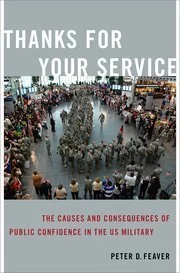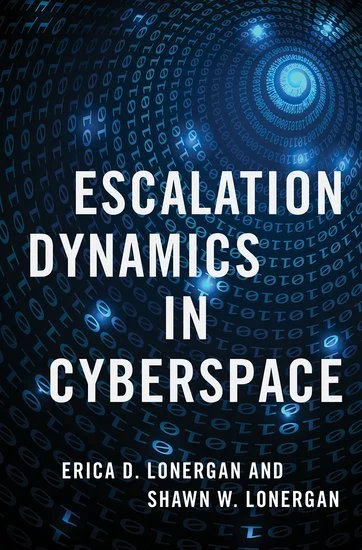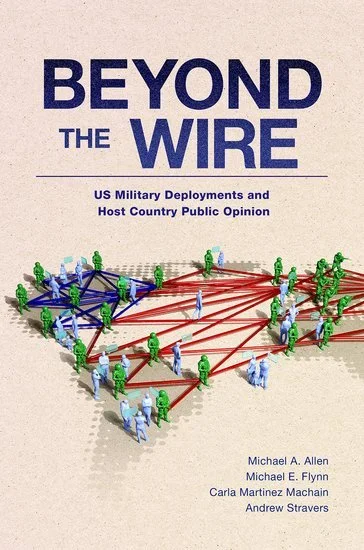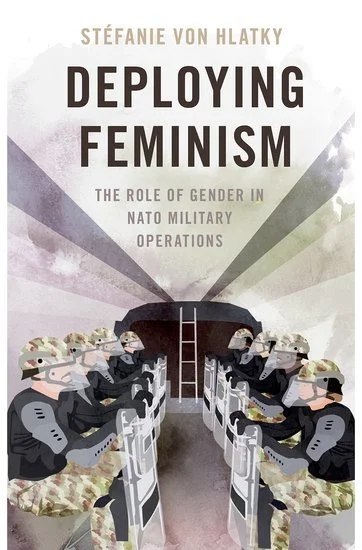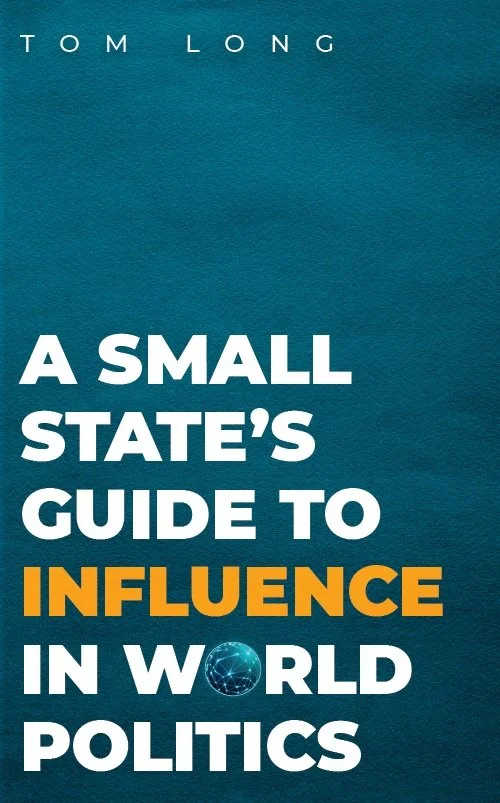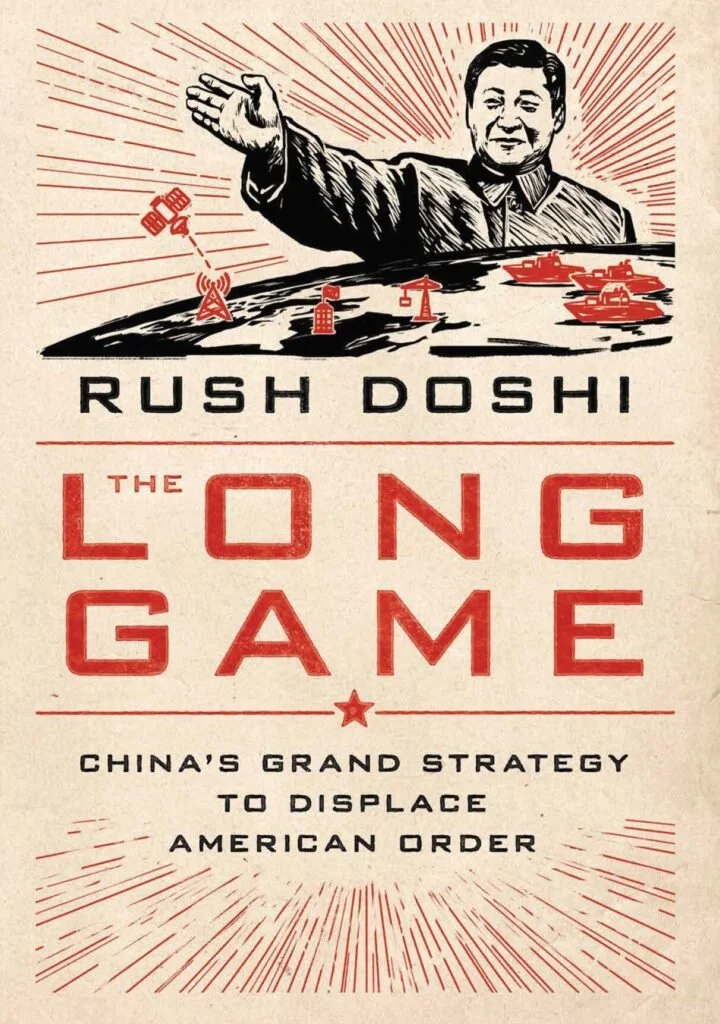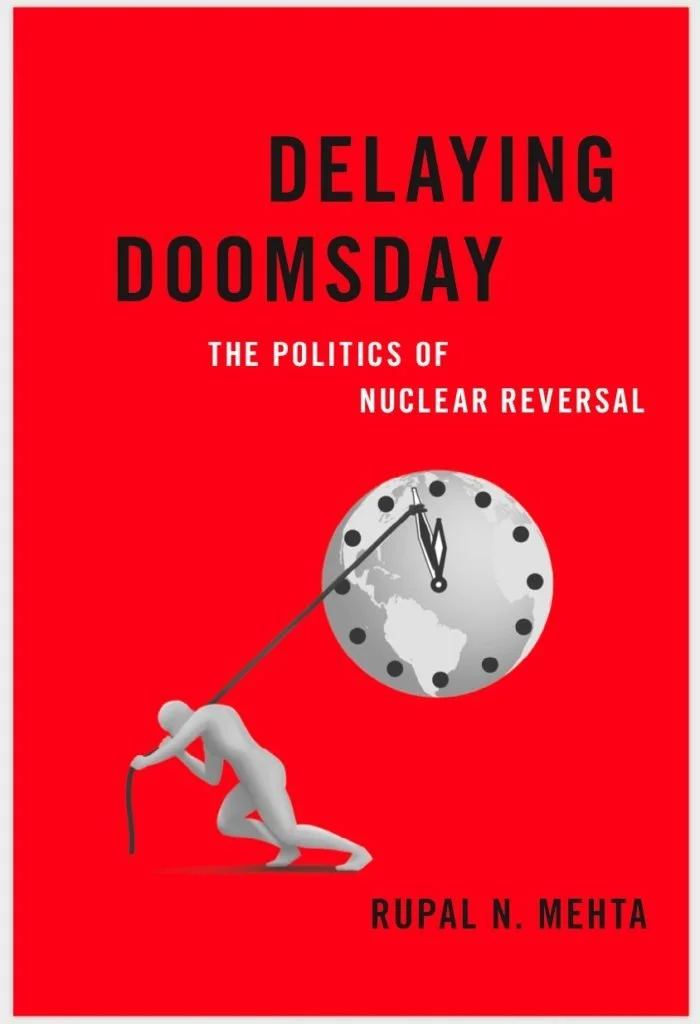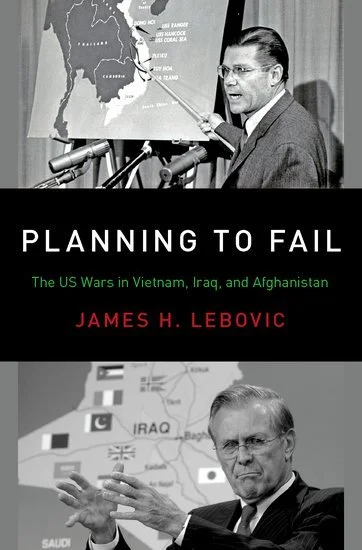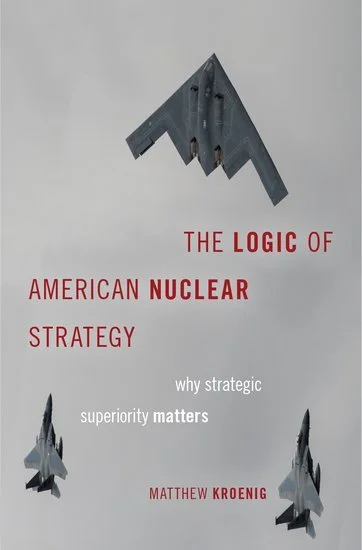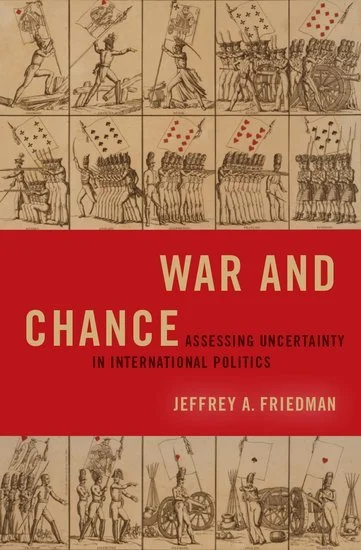Oxford University Press Bridging the Gap Series
Bridging the Gap and Oxford University Press, considered among the most prestigious university presses worldwide, have partnered in creating the Bridging the Gap Book Series. The series publishes manuscripts that are written to engage both academic and policy audiences, and make significant contributions to debates in both communities.
“Publishing with the series was one of the best professional decisions I’ve made. It opened the door to engagement beyond academia, with civil society, government, the military, RAND, and NATO."
-Stéfanie von Hlatky, Full Professor and Canada Research Chair, Queen’s University.
Published
“This important book provides data that is going to fuel a decade of civil-military scholarship. Peter Feaver is the lighthouse for all of us in the field and shows conclusively that our military needs to work harder to keep its feet out of the wolf trap of partisan politics if it is to remain broadly respected by Americans.” — Kori Schake, Director of Foreign and Defense Policy Studies, American Enterprise Institute
“No one—and I mean no one—knows more about the relationship among the military, our elected civilian officials, and the general populace than Peter Feaver. An insightful, important, and timely work.” — General Martin Dempsey, 18th Chairman of the Joint Chiefs of Staff
Escalation Dynamics in Cyberspace
By Erica D. Lonergan and Shawn W. Lonergan
“Escalation Dynamics in Cyberspace deftly demonstrates why the realities of cyberspace don’t match up to the hype. Erica and Shawn Lonergan provide an exemplary frame to demystify the implications of cyberspace for geopolitics and, in doing so, demonstrates to security practitioners the nuances and challenges of nation-state cyber operations.” — Colin Ahern, Former Acting CISO, New York City Cyber Command
“As cyber technology has rapidly permeated every aspect of modern life, analysis has been scrambling to catch up with its impact on international conflict. Lonergan and Lonergan skillfully examine the risks in the aspect of greatest potential danger, escalation within and beyond the cyber realm. Their careful assessment goes beyond the facile intuitions that have dominated much commentary so far. It is refreshingly less alarmist than much conventional wisdom on several crucial facets of the question, while confronting the more frightening prospects on others. This book is the definitive work to date on escalation in cyber conflict.” — Richard K. Betts, Leo A. Shifrin Professor of War and Peace Studies, Columbia University
Beyond the Wire: US Military Deployments and Host Country Public Opinion
by Carla Martinez Machain, Michael A. Allen, Michael E. Flynn, and Andrew Stravers
“Beyond the Wire is the most ambitious study to date examining the politics of overseas U.S. military deployments. Drawing on an impressive fourteen country survey and in-depth interviews across three continents, the authors unpack when and how host nations give consent or resist U.S. military presence. Their findings carry deep implications for global hierarchy and the liberal international order.” — Andrew Yeo, SK-Korea Foundation Chair and Senior Fellow, Brookings Institution, and Professor of Politics, The Catholic University of America
“Beyond the Wire offers an illuminating and innovative take on the topic of societal-military relations –in the authors’ case, on those between individual soldiers based overseas and the communities that host them. The book shows how the character of interactions between foreign military personnel and local citizens can have far reaching implications for international politics. In so doing, it moves civil-military relations research in new and exciting directions.” — Risa Brooks, Allis Chalmers Associate Professor of Political Science at Marquette University
Recipient of Army Strategist Association's 𝘋𝘳. Andrew F. Krepinevich Writing Award.
“Timely does not begin to cover Robinson’s book as the state of American civil-military relations is as perilous as it has been in 160 years. He punctures the myth that the military has not been affected by the intense partisanship dynamics that have tainted all other public institutions. Robinson provides keen insights into how partisan dynamics are shaping the place of the U.S. military in American politics, based on the creative and rigorous deployment of surveys.ÂThis book is essential reading not just for scholars of civil-military relations but for those seeking to understand the decline of American institutions.” — Stephen M. Saideman, Paterson Chair in International Affairs, Carleton University
“Robinson has produced an indispensable book on the American military and its changing relationship to our broader public. His research reveals the ways societal trends are affecting the military, eroding the norm of an apolitical culture: the American public is clamoring for partisan political activity by both active duty military and veterans, even as they respect the institution of our military less for engaging in it.” — Kori Schake, Senior Fellow and Director of Foreign and Defense Policy Studies, American Enterprise Institute
Dangerous Instrument: Political Polarization and US Civil-Military Relations
by Michael A. Robinson
“A timely and important contribution that bridges long standing gaps between feminist theory, strategic studies, and civil-military analysis. Von Hlatky’s expert and careful analysis, particularly her brilliant development of the concept of ‘norm distortion,’ helps address a question that has plagued feminists for the past decade: Why and how has institutional adoption of feminist concepts failed to translate into radical and transformative agendas? Through her international case studies, and clear expertise of NATO operations, the WPS agenda, feminist theory, and foreign policy, von Hlatky draws out unique conclusions about the process through which feminist ideals can be filtered, diluted, and militarized in military organizations, while at the same time, militaries ‘deploying’ this rhetoric remain largely unchanged.” — Megan MacKenzie, Simon Fraser University
“In Deploying Feminism, Dr. Von Hlatky looks at what happens when the Women, Peace and Security agenda is converted into NATO military operations, asking how gender norms have changed NATO operations, but also what gets lost in translation when those norms meet military culture. She delivers an engaging first-person account through interviews with NATO commanders, soldiers and officials in Kosovo, the Baltics, Iraq and Brussels. The book is an important contribution for practitioners and scholars alike: it draws important lessons on how militaries and international peace missions can do a better job on gender and offers a thoughtful take on how the international Women, Peace and Security agenda has been transformed.” — Kerry Buck, Former Canadian Ambassador to NATO
Deploying Feminism: The Role of Gender in NATO Military Operations
by Stefanie von Hlatky
Cyber Persistence Theory: Redefining National Security in Cyberspace
by Michael Fischerkeller, Emily Goldman, and Richard Harknett
“Cyber Persistence Theory is an important addition to our collective understanding of the dynamics of cyberspace and its implications for national security. It provides sound insight and excellent analysis on how we can meet the challenges of cyber in the hyper-connected, digitally driven world we find ourselves in today. Excellent work on a topic of increasing importance to all!” –Admiral Michael S. Rogers, USN (ret) former Commander, US Cyber Command and Director, National Security Agency (2014-2018)
“This timely new book is destined to go down as a major milestone in the development of new strategic thought for twenty-first century. With admirable clarity and powerful prose, the authors first dismantle the deterrence-focused paradigm that has so far guided US defense strategy in cyberspace and then formulate a new organizing concept. Anyone interested in cyber security must come to terms with this new thinking.” –Brad Roberts, Center for Global Security Research
“Written with clarity and rigour, this is a must-read book for anyone who wants to understand how and why small states fail or succeed in world politics.” –Anders Wivel, Professor of International Relations, Department of Political Science, University of Copenhagen ”
“Based on IR theory and grounded in small states scholarship, this book provides an innovative integrated account of small states strategies to deal with constraints and opportunities they face in world politics. The comprehensive theoretical argument is illustrated by a series of compelling short case studies. This timely book is a must-read for scholars and practitioners alike.” –Diana Panke, Chair of Multi-level Governance, University of Freiburg (Germany) ”
“The Long Game is essential in understanding China’s approach to the evolving US-China relationship and global order. Unique in scope and unmatched in substance, Rush Doshi’s masterfully researched work describes clearly the economic, political, and military contours of China’s strategic approach. The observations, analysis, and recommendations of this superb work must be foundational to any China playbook—business, political, or military.” –Admiral Gary Roughead, U.S. Navy (Retired)
“A must-read for anyone wrestling with the China Challenge. Doshi’s careful analysis of Chinese language documents make a powerful case that China is pursuing a coherent grand strategy to overturn the US-led international order.” –Graham Allison, Professor of Government, Harvard Kennedy School
“This is an important and timely book on the importance of adapting our military when confronted with a new enemy strategy. The authors draw on the wars in Afghanistan and Iraq for examples of when the commanders did not adapt their strategy to the challenge posed by unconventional warfare. And it describes how success was achieved when a new commander introduced a new strategy adapted to those challenges. A well-written and interesting analysis of a subject that has become critically important to the U.S. military.” — William J. Perry, 19th U.S. Secretary of Defense
“Historically, the American military learns expensively by failure. Our current and future enemies may deny us even the time to adapt. The sharp policy recommendations Dr. Bensahel and retired General Barno offer in this excellent book would improve our military’s resilience in advance–something the American military urgently needs, and that will lower the cost in blood and treasure our country pays in future wars.” — Kori Schake, Director of Foreign and Defense Policy Studies, American Enterprise Institute and editor of Warriors and Citizens: American Views of Our Military
Adaptation Under Fire: How Militaries Change in Wartime
by Lt. General David Barno and Nora Bensahel
“Everyone interested in Egypt and Egyptian politics must read Herrold’s illuminating new book, Delta Democracy. In this well-written, deeply researched volume, Herrold argues convincingly that ‘democracy brokers’ in the West and international non-governmental organizations have been manifestly ineffective in advancing democratic change because they fail to understand the political, historical, and social contexts in which they operate. Herrold demonstrates that Egyptian non-governmental organizations and foundations are better positioned for success. Delta Democracy is an invaluable addition to the literature from which academics, policymakers, practitioners, and foundation program officers will benefit.” — Steven A. Cook, Eni Enrico Mattei Senior Fellow for Middle East and Africa Studies, Council on Foreign Relations
“Delta Democracy tells the story of Egypt’s political trajectory over the past decade-seemingly a familiar one told by headlines about uprisings, elections, coups, and authoritarian rulers-in a fresh and unfamiliar way. Herrold uses a host of small-scale Egyptian organizations, some operating seemingly far from the political field, as a prism to help us understand what democracy means-and does not mean-in a local context” — Nathan Brown, Professor of Political Science and International Affairs, George Washington University
Delta Democracy: Pathways to Incremental Civil Revolution in Egypt and Beyond
by Catherine Herrold
“Delaying Doomsday sheds new light on an important and policy-relevant question: when and why do states end their pursuit of nuclear weapons? The book highlights the importance of US policy for effectively countering nuclear proliferation around the world.” — Elizabeth N. Saunders, Associate Professor, School of Foreign Service, Georgetown University
“Why do countries renounce their nuclear ambitions? Rupal Mehta answers this important question with a novel theory and evidence, pointing to the crucial role of external actors such as the United States in shaping incentives for states to undergo nuclear reversal. Accessible, timely, and compelling, the book has enormous implications for ongoing proliferation challenges such as Iran and North Korea and the conduct of US foreign policy.”-” — Sarah E. Kreps, Professor of Government, Cornell University
Delaying Doomsday: The Politics of Nuclear Reversal
by Rupal N. Mehta
“Planning to Fail breaks new ground in the study of US grand strategy and military performance. Instead of asking why the United States chose to fight in Vietnam, Afghanistan, and Iraq, Lebovic focuses on how different administrations waged each war and how haphazard strategic planning made it impossible to achieve their aims. His accounts of these long and unsuccessful campaigns are rich, detailed, and convincing, and the book contains many important lessons for leaders hoping to avoid their predecessors’ mistakes.” – Stephen Walt, Robert and Renee Belfer Professor of International Affairs, Harvard Kennedy School
“In this path-breaking study, Lebovic explains how the policy milieu in Washington produced similar patterns in the course and conduct of US intervention in Vietnam, Iraq and Afghanistan. Officials responded to proximate goals in each of these conflicts, never devising a grand strategy that could capitalize on success or reduce the possibility of failure. Planning to Fail offers critical insight into the limits of the policy process when it comes to avoiding the perils of intervention.” – James J. Wirtz, Dean of School of International Graduate Studies and Professor, Naval Postgraduate School
Planning to Fail: The US Wars in Vietnam, Iraq, and Afghanistan
by James H. Lebovic
“The Logic of American Nuclear Strategy is a major contribution to the national debate about the role of nuclear weapons in U.S. national security policy. Matthew Kroenig provides penetrating insights into how nuclear posture affects a variety of national security interests and the book is a must read for anyone who wishes to understand this increasingly vital set of issues.” – Stephen Hadley, former National Security Adviser to U.S. President George W. Bush
“Matthew Kroenig has provided an innovative and counter-intuitive study of why nuclear superiority might matter and why practitioners of both political parties have gravitated consistently towards it even as academic theorists have argued that it doesn’t matter. This is an agenda setting book that will be debated by scholars and policy-makers for years to come.” – Eric Edelman, former Under Secretary of Defense for Policy and Hertog Practitioner-in-Residence at Johns Hopkins University School of Advanced International Studies
Recipient of the 2020 Peter Katzenstein Book Prize honoring an outstanding first book in International Relations.
“Jeff Friedman’s War and Chance makes an important contribution to the literature on intelligence analysis, intelligence reform and the assessment and evaluation of evidence in intelligence estimates. It is comprehensive, well-written, well-organized, and meticulous in its analysis. It carefully, logically and strongly advocates for the use of more precise numerical probability estimates in making judgments and predictions regarding uncertain events over the use of vague wording such as ‘highly likely’ or ‘unlikely.’ Friedman’s book does a terrific job marshaling an enormous amount of material to make a creative argument which deserves much wider discussion.” – Rose McDermott, Professor of International Relations, Brown University
“The world is uncertain, but even the most experienced leaders and policy experts have great difficulties dealing with probabilities. Jeffery Friedman’s deep discussion of how this kind of analysis can lead not only to a better understanding but also to better practices.” – Robert Jervis, author of How Statesmen Think
War and Chance: Assessing Uncertainty in International Politics
by Jeffrey A. Friedman
Military Medicine and The Hidden Costs of War
By Tanisha M. Fazal
"This book is an exposé on the biggest long-term cost of wars--healing the service members who return home with visible and invisible scars. The need for medical care and rehabilitation, for medical staff and family caregivers-is often hidden while we go off to fight new wars. Tanisha Fazal lifts the lid on this story and helps us understand, with compassion, what it means to care for America's wounded and their families." --Linda J. Bilmes, Daniel Patrick Moynihan Chair in Public Policy and Public Finance, Harvard Kennedy School, and coauthor of The Three Trillion Dollar War
The Hand Behind Unmanned tells the fascinating story of the people, processes, and beliefs that led to the contemporary American unmanned arsenal. It takes an expansive look at automated and autonomous technologies, from mines and torpedoes, to guided bombs and missiles, satellites, and ultimately drones. Instead of asking the question: "why unmanned rather than manned," the book explains why certain types of unmanned systems became popular while others languished in research or in small pockets of the American military.
The Hand Behind Unmanned: Origins of the US Autonomous Military Arsenal
By Jacquelyn Schneider and Julia Macdonald
Algorithms & Atrocities: Cyber Humanitarian Interventions in Genocides, War Crimes, and Crimes Against Humanity by Rhiannon Neilsen
Coercing Syria on Chemical Weapons by Matthew Moran, Wyn Bowen and Jeffrey W. Knopf
Mass Expulsion – The Politics of Forced Population Removal by Meghan Garrity

